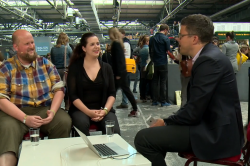andreisoldatov.jpg

Andrei Soldatov is no stranger to the re:publica. The investigative journalist from Moscow was a speaker at last year’s conference as well, where he reported on the increasingly invasive Internet censorship promoted by Russian authorities. He explained how the Russian secret service FSB uses a monitoring system of its own, called SORM, as well as deep packet inspection (DPI), to systematically eavesdrop on Russian network traffic.
The online platform Agentura.Ru, which he founded back in 2000, constantly monitors the activities of the Russian intelligence agencies. In 2010, together with Irina Borogan, he published “The New Nobility: The Restoration of Russia’s Security State and the Enduring Legacy of the KGB” (PublicAffairs, 2010), uncovering the political influence of the FSB, an agency emerged from the former KGB. In 2012, Agentura.Ru, Privacy International and the Citizen Lab founded the joint project “Russia’s Surveillance State”. And in January 2014, Soldatov testified as an expert on Russian interception methods in front of the European Parliament’s Committee on Civil Liberties, Justice and Home Affairs (LIBE).
Soldatov has fond memories of #rp14, and Sarah Harrison’s talk in particular left a lasting impression. “It was not the talk as much as the number of people that gathered to listen – that really was impressive”, he recalls. Soldatov himself will be back at re:publica 2015 to report on the state of the Russian surveillance state. “2014 was a special year for the Russian Internet”, he says. “The government put unprecedented pressure on global and national Internet companies, and Putin himself called the Internet a CIA project. This year promises to be even more eventful, since Putin signed a law on December 31, 2014, which requires that globally operating platforms move their servers to Russia by September 2015”, says Soldatov.
Even so, 2014 was not all bad for him; he still has some hope: “Despite all the pressure and grim mood in Moscow following the annexation of Crimea, despite the patriotic hysteria and sanctions, the digital society is surprisingly alive. It was last seen on December 30, when last time it was that, when 30,000 people signed up on Facebook to participate in rallies to protest the repressions that the Navalny family were experiencing. People were mobilized not by some political party, organization or trade union, but through social networks.”
(Editor’s Note: Last year, well-known Putin critic Oleg Navalny was sentenced to a prison term of three and a half years, while his brother Alexei got off on probation, but was kept under house arrest and finally arrested in December 2014 when he tried to take part in a demonstration for his brother.)



